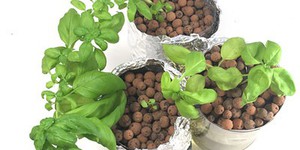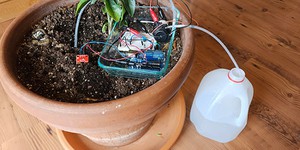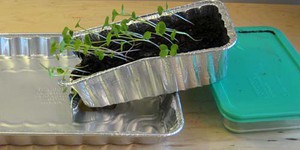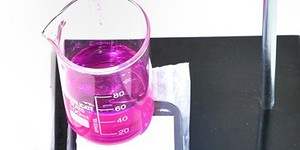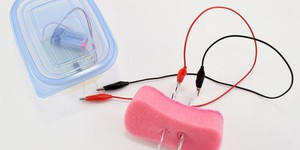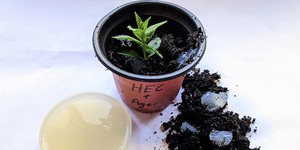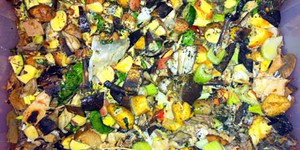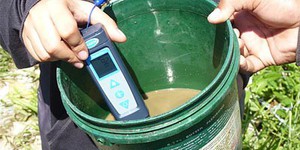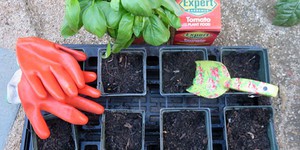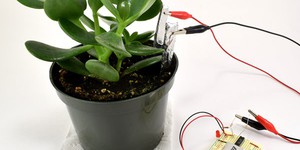U.N. Sustainable Development Goal: Zero Hunger (49 results)
The United Nations Sustainable Development Goals (UNSDGs) are a blueprint to achieve a better and more sustainable future for all.
These projects explore topics key to Zero Hunger: End hunger, achieve food security and improved nutrition and promote sustainable agriculture.
These projects explore topics key to Zero Hunger: End hunger, achieve food security and improved nutrition and promote sustainable agriculture.
|
Sort by
|
What do plants need to grow? Most of us would answer that they need light, air, water, and soil. But by using a process called hydroponics, you can grow plants without soil! How does it work? Try this project and see for yourself!
Read more
Have you ever taken care of a plant? It can be tricky to get it right. You have to remember to water it regularly, and you also have to make sure to give it the right amount of water — not too much or too little. What if technology could help? In this engineering project, you will learn how to automate the entire process of watering a plant. Using a soil moisture sensor and a pump, you will build a circuit that will automatically detect when the soil is too dry, add water, and stop when…
Read more
Soil erosion can cost the world billions of dollars every year by washing pollutants into our streams and rivers and by causing the loss of farmland. What can you do about this problem? Help save the world (and some money!) with nothing more than a few plants!
Read more
Have you ever wondered why some foods taste really sour? Vinegar is one example that you might know from salad dressings or pickles. They taste pretty sour, right? There are many different types of vinegar that you can buy to use around the kitchen for cooking and pickling. The chemical compound that gives vinegar its tart taste and pungent smell is acetic acid. Do you think all the different vinegars contain the same amount of acetic acid? Are there some that are more sour than others? How…
Read more
Water is a valuable resource, and water shortages are a serious problem in many parts of the world. The problem can be made worse by people who waste water; for example, by watering a garden or using sprinklers on their lawn (or a farmer taking care of an entire field) when it has rained recently or the soil is already moist. How can you help conserve water and prevent such waste? One way is to build an electronic soil moisture sensor. This project will show you how to build a circuit that…
Read more
Growing crops takes a huge amount of water. That same water is also needed for drinking, bathing, and other industries. In dry climates or lands experiencing drought, there is a big push to conserve (save) water as much as possible. In this project you will experiment with creating environmentally friendly jelly-like materials called hydrogels and see if they can help soil retain water thus reducing the amount of water needed to grow crops.
Read more
Have you ever seen a product labeled "biodegradable" or "compostable" and wondered just how well it decomposes? A lot of different products claim to be biodegradable or compostable, such as food containers, bags, packaging materials, and spoons and forks. Not only do they clearly come in different shapes and sizes, but they are made of different materials as well. Do they decompose differently, and, if so, which decomposes the fastest? In this science project, you will make your own indoor…
Read more
Did you know that soils can be alkaline, neutral, or acidic? Most plants grow best in soil near neutral pH, but some plants prefer slightly acidic and others slightly alkaline soil. What is the pH of the soil in your garden? What happens to the pH of water that comes in contact with soil? In this science project you will get to find out.
Read more
Plants need nitrogen to grow healthy stems and leaves. Although nitrogen is the most abundant element in the air we breathe, that form of nitrogen cannot be used by plants. Nitrogen contained in fertilizer, on the other hand, is readily taken up by plants. In this experiment, you will compare plants grown without nitrogen fertilizer to plants grown with nitrogen fertilizer.
Read more
Do you or your family have a lawn, garden, or potted plants that you water regularly? Irrigation—or the artificial application of water to plants and landscaping—accounts for over two-thirds of the world's freshwater consumption (U.S. Geological Survey, 2016)! While that total includes farms, in the United States landscape irrigation still accounts for almost one-third of residential water use. As much as half of that water is wasted due to inefficient watering methods (WaterSense,…
Read more
|
Explore Our Science Videos
Build a Model Recycling Sorting Machine
Turn Milk Into Plastic!
DIY Mini Drone Part 2: Altitude Control Circuit


